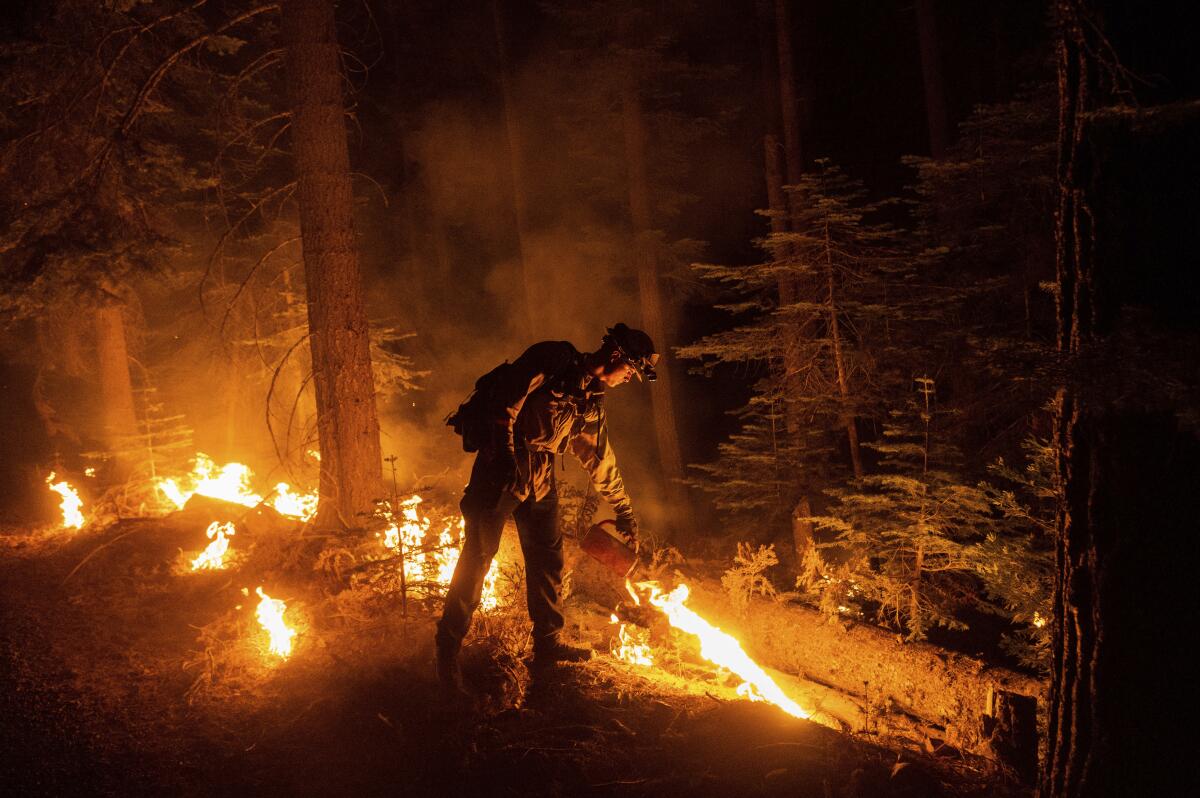Op-Ed: To turn back Dixie fire and others in California, raise pay for federal firefighters

- Share via
Last year, wildfires burned a record 4.4 million acres in California. Thirty-three people were killed and 10,000 structures were destroyed, including 5,500 homes.
As bad as last year was, this year’s severe drought conditions and early wildfire activity mean 2021 could be even worse. Already we’ve seen the Dixie fire scorch nearly half a million acres in Northern California, a huge fire for so early in the season.
While California has made an effort to hire more firefighters and provide sufficient resources to fight fires on state land, the federal government has fallen behind. This is particularly dangerous considering 58% of California’s forests are on federal land.
The only long-term solution to reduce wildfires is to confront climate change head-on. Unless we take strong action, conditions that cause wildfires will continue to worsen.
However, there are near-term actions we can take that would make a real difference in confronting the wildfire risk. One of those actions is eliminating the extreme pay gap between federal and state wildland firefighters.
The starting salary for many federal U.S. Forest Service firefighters in California is $28,078, barely 40% of the $66,336 entry-level salary Cal Fire pays. It’s clear why federal agencies have trouble attracting and retaining skilled firefighters.
Last August, at the height of a historic fire year, the Forest Service’s Pacific Southwest region had 600 unfilled firefighting positions, far below its goal of approximately 5,000 total firefighters. This year there are about 730 unfilled positions.
By contrast, Cal Fire hired nearly 3,000 additional temporary firefighters last year to support more than 5,000 permanent firefighters and expects to hire even more this year.
President Biden recently took the first step to address what he called “ridiculously low” salaries by raising the minimum firefighter wage to $15 per hour and providing recruitment and retention bonuses to most of the workforce.
However, even that move left salaries woefully out of sync with the job market and the cost of living. Moreover, low federal firefighter salaries fail to account for the critical importance and dangerous nature of the work.
The infrastructure bill currently being debated in the Senate includes $600 million to help address the pay gap. It would increase federal firefighter salaries by 50%, up to a maximum increase of $20,000 per individual. An entry-level firefighter’s $28,078 salary would increase to $42,117, narrowing but not eliminating the pay gap.
The only way to permanently fix this problem and close the pay gap is by creating a new federal job classification and higher pay series, specifically for federal wildland firefighters.
Earlier this year I partnered with Sen. Steve Daines (R-Mont.) on a bill to begin this job reclassification process. Once that’s accomplished — and I believe it will be — the federal government should seek to hire more wildland firefighters as soon as possible. The Forest Service’s current goal of hiring approximately 5,000 firefighters in the Pacific Southwest region may be far fewer than needed — but at least filling existing vacancies would be a good start.
The federal government must live up to its responsibility to protect the land it manages. Major fires endanger lives, property, natural resources and wildlife, so we must do all we can to address the worsening scourge of wildfire.
It is vital for Congress and the Biden administration to invest more resources in dealing with the magnitude of these increasingly deadly and devastating wildfires, and that needs to start with fair salaries for the firefighters who protect us.
Dianne Feinstein, a Democrat, is the senior U.S. senator from California.
More to Read
A cure for the common opinion
Get thought-provoking perspectives with our weekly newsletter.
You may occasionally receive promotional content from the Los Angeles Times.










